Rwanda’s dedication to conservation has produced noteworthy outcomes, as Nyungwe National Park has been formally recognized and included in the esteemed UNESCO World Heritage List. The declaration was met with great enthusiasm by Yolanda Makolo, a representative of the Rwandan government, who expressed, “Nyungwe Park in Rwanda has achieved a remarkable milestone by becoming the first site in our country to be granted a place on UNESCO’s World Heritage List. This designation will undoubtedly strengthen Rwanda’s ongoing efforts in conservation.”

On a recent occasion, the United Nations Educational, Scientific, and Cultural Organization (UNESCO) unveiled its latest additions to the list of World Heritage Sites, which now includes Nyungwe National Park.
Nyungwe, an ancient rainforest in Africa, possesses exceptional biodiversity and awe-inspiring natural magnificence. Established in 2004, Nyungwe Forest National Park spans across a vast area of 970 square kilometers, encompassing rainforests, bamboo forests, grasslands, wetlands, and marshes.
This extraordinary park serves as the primary natural habitat for several species that are exclusive to this location, including the globally endangered Eastern Chimpanzee (Pan troglodytes schweinfurthii), Golden Monkey (Cercopithecus mitis ssp. kandti), and the critically endangered Hills Horseshoe Bat (Rhinolophus hillorum). Furthermore, Nyungwe National Park plays a crucial role in bird conservation in Africa, with a recorded count of 317 bird species, including 12 mammals and seven bird species facing worldwide threats.
Nyungwe National Park
Encompassing approximately 102,000 hectares in the southwestern region of Rwanda, Nyungwe National Park acts as a haven for undisturbed forests, peat bogs, moors, thickets, and grasslands, providing support for a diverse range of plant and animal life.
UNESCO emphasized, “The Park also contains the most significant natural habitats for a number of species found nowhere else in the world, including the globally threatened Eastern Chimpanzee (Pan troglodytes schweinfurthii), Golden Monkey (Cercopithecus mitis ssp. kandti), and the Critically Endangered Hills Horseshoe Bat (Rhinolophus hillorum).”

The UN agency underscored the park’s crucial role in protecting 12 endangered mammal species and seven bird species on a global scale, reaffirming its status as a paramount bird conservation site in Africa.
This significant accomplishment follows Rwanda’s formal request to UNESCO in December 2021 for Nyungwe’s inclusion in the World Heritage List, a move that received praise from conservationists as a notable step forward.

It is worth noting that Nyungwe National Park is the primary source of up to 70 percent of Rwanda’s freshwater and holds an estimated economic value of $4.8 billion.
Prior to Nyungwe’s inscription, Rwanda was among the 12 African countries without a UNESCO World Heritage site. The Rwandan government has also submitted requests for the inclusion of four memorial sites associated with the 1994 Genocide against the Tutsi on UNESCO’s World Heritage List.

